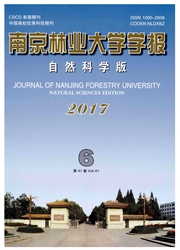

 中文摘要:
中文摘要:
雪灾是一种重要的自然干扰类型,通过改变资源的有效性和异质性而对森林生态系统过程产生显著影响。笔者以福建武夷山的常绿阔叶林为试验地,探讨雪灾干扰后不同土层(0~10cm、10~25cm和25~40cm)常绿阔叶林土壤微生物生物量氮和可溶性氮的变化。结果表明:受灾常绿阔叶林土壤微生物生物量氮、可溶性有机氮、铵态氮含量除25~40cm土层外都显著高于对照,随土层深度的增加而减少;受灾常绿阔叶林各土层土壤硝态氮含量与对照无显著差异。相关分析显示土壤微生物生物量氮、可溶性有机氮、铵态氮含量均与土壤温度、土壤湿度呈极显著正相关。研究结果表明,由于雪灾导致了土壤温度和湿度的改变,土壤中的氮可能以铵盐和可溶性有机氮的形式从生态系统中流失。
 英文摘要:
英文摘要:
Snow storm is a significant natural disturbance. It affects ecosystem processes by altering resource availability and heterogeneity. To understand the effect of snow storm on soil microbial biomass nitrogen and total soluble nitrogen in different soil layers (0—10 cm,10—25 cm and 25—40 cm),an experiment was conducted in evergreen broad leaf forest in Wuyi Mountain. The results showed that the concentrations of soil microbial biomass nitrogen,soluble organic nitrogen and ammonium in the damaged evergreen broad leaf forest were significantly higher than that in the control forest except the 25—40 cm soil layer,decreased with soil depth. Soil nitrate concentrations are different between the damaged and the control evergreen broad leaf forest in three soil layers. The concentrations of soil microbial biomass nitrogen,soluble organic nitrogen and ammonium were positively correlated with the soil moisture and soil temperature significantly. The results indicated that the soil nitrogen might loss from the forest ecosystem by way of the ammonium and the soluble organic nitrogen ,for the changes of soil moisture and soil temperature caused by snow storm.
 同期刊论文项目
同期刊论文项目
 同项目期刊论文
同项目期刊论文
 Temperature sensitivity increases with soil organic carbon recalcitrance along an elevational gradie
Temperature sensitivity increases with soil organic carbon recalcitrance along an elevational gradie Spectroscopic characterization of hot-water extractable organic matter from soils under four differe
Spectroscopic characterization of hot-water extractable organic matter from soils under four differe Effects of soil microarthropods on plant litter decomposition across an elevation gradient in the Wu
Effects of soil microarthropods on plant litter decomposition across an elevation gradient in the Wu 期刊信息
期刊信息
